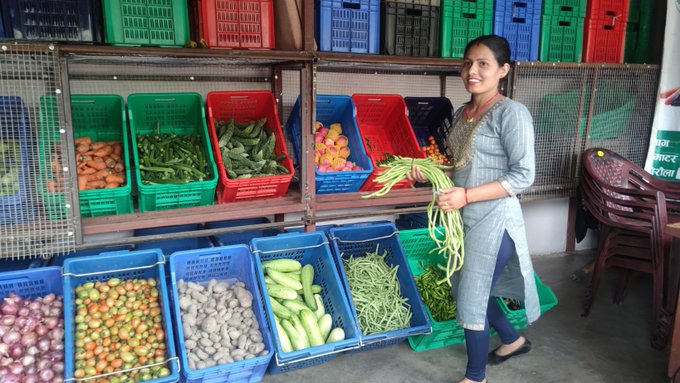“Minimum Support Price MSP could be a game-changer for farmers in #Nepal!
Minimum support price empowers farmers and boosts agricultural growth
In a remarkable success story that holds the potential for replication, the implementation of a minimum support price policy has transformed farming in Phedikhola Rural Municipality, Syangja.
The policy, which guarantees farmers a minimum price for their produce, has instilled confidence among farmers and provided them with a secure market, ensuring they never incur losses.
Ghanshyam Subedi, Chair of Phedikhola Rural Municipality says the policy has attracted more youth to commercial farming and significantly boosted vegetable exports.
“We have witnessed a remarkable increase in export of vegetables from Rs. 2.5 million some four years ago to over Rs. 100 million today,” said Subedi. The municipality has declared minimum price guarantees for 26 vegetable and fruits that are most commonly grown in the area.
Shanti and Bishnu are among some 1000 small farmers who have benefited from the facility at least once. When cabbage prices plummeted to Rs. 5 per kg last year, they received Rs. 8 per kg through the scheme, saving their small investment. “These guarantees boost our confidence to invest and produce on a larger scale,” Bishnu affirmed.
“We no longer dump our hard-grown vegetables when they fail to fetch a minimum price,” added Shanti. Most of these farmers have been able to sell their organic products at a slightly higher price compared to imported vegetables.
In the past, farmers in the municipality, mostly smallholders, often dumped their vegetables when they didn’t receive the minimum price due to the perishable nature of vegetables, lack of storage facilities, and financial burden of storing unsold produce. This has been a problem across the country. Only few months ago, vegetable farmers in Chitwan dumped their produce on the streets protesting the lack of government regulation to protect domestic products.
“Today, I can invest and produce vegetables in full confidence. This is a big relief for small farmers like me,” said Umalal, a cucumber farmer. “There is high demand for organic and locally grown fresh vegetables. I sell all my produce right from the farm. This means I can produce more and earn more.”
Minimum support price, an international practice
According to Shankar Sapkota, Senior Agriculture Economist, MoALD, minimum price guarantee is practiced across the world in many different forms, and it has been adopted in Nepal at the national level for a select set of crops, mainly paddy, for quite some time.
“The Minimum Support Price is a tool that assists farmers in making informed decisions. It is announced at different stages of the crop production cycle, including before and during the harvest. It helps farmers determine whether or not to cultivate, which crop to cultivate, what kind of inputs to use, where to market, and estimate their income,” said Sapkota. India has also been providing MSP for a set of 23 commodities as a tool to encourage substantial domestic production.
Situated just 18 km from the major tourist city of Pokhara, Phedikhola’s case, being the first-of-its-kind, offers a unique opportunity in understanding how local governments can be engaged in implementing the MSP tool in favor of smallholders.
Phedikhola is a rural municipality with highly fertile cultivable land, suitable for citrus fruits and most of the high-demand vegetables and spices like ginger, garlic, peas, mushroom, potato, tomato, cauliflower, cabbage and carrot. “Climate here is perfect and market is not a problem for us, as we are very close to the city. What we need is security,” said Umalal.
The success in Phedikhola can be attributed in part to the UNDP Value Chain Development Project, funded by Korean International Cooperation Agency (KOICA), which has provided technical capacity building to 37 local governments, including this Phedikhola municipality, facilitating agricultural sectoral planning and implementation. The project has offered hands-on support such as agricultural inputs, training, grants, market access, and value chain development.
Minimum support price combined with production-based incentive
The MSP has been more effective in Phedikhola as Phedikhola has combined it with production-based incentive. For example, if the market price is less than the minimum price, the municipality will top up to ensure the farmer gets the minimum price of his/her produce. But the farmer also gets a production-based incentive in case of sales above the minimum price rate. For example, if a farmer sells tomato at the rate of Rs. 50 per kg when minimum support price is Rs. 30, the farmer will get an additional 15% (of Rs. 30) cash incentive.
“This output-based incentive ensures additional benefit to farmers to stay in production, strengthens market chain with the cooperatives involved in sourcing produce from farmers, and helps local government monitor the production and sales from their farmers,” said Yadav Padhyoti, National Project Director of the Value Chain Development Project.
The success story of Phedikhola has garnered attention at the local level, with host of cooperative farmers and people’s representatives from other municipalities visiting Phedikhola to learn from the working of the new scheme.
Source: https://undpnepal.medium.com/minimum-support-price-empowers-farmers-and-boosts-agricultural-growth-7750d48e8174


Comments are closed.